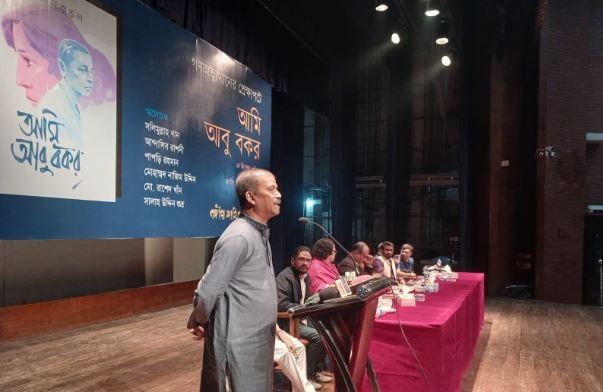
DHAKA, Dec 14, 2024 (BSS) – Writer and Novelist Dr Asif Nazrul today said the fascist Awami League (AL) government had carried out brutal torture, oppression on students on university campuses and other people across the country by branding them as Chhatra Shibir or Jamaat leaders or activists.
“During the last 15 years’ regime of the government (led by fascist Sheikh Hasina), none can speak in favour of Jamaat-Shibir and against the torture, which came down on them through the ‘politics of tagging’,” he said while speaking at a discussion at the auditorium of Bangladesh National Museum in city’s Shahbagh area.
The ‘Bongio Shahitto Sova’, a cultural platform, organized the discussion on Dr Asif Nazrul’s novel titled ‘Ami Abu Bokor’ centering the July-August Mass Uprising.
Dr Asif Nazrul said he became frustrated facing difficulties in publishing his writings in newspapers against the ruling party-led government in the recent past.
In this democratic country like Bangladesh, he faced difficulties just for expressing different opinions, he stated.
“Many dear and near ones left me, maintained distance with me when I asked in which law people can be beaten on the suspicion of Shibir,” he said, criticizing the fascist government's practice of suppressing people’s freedom of speech.
“I knew three topics cannot be discussed. First one is the rule (of the country) and the second one is Hasina-India. I am not telling the three one still now,” he said with smile in face.
Noting that he had been staying on the university campus for 35 years, Asif said students would have been tagged as Shibir intentionally.
On university campus, even no teacher came to rescue their students who were tagged with Shibir, he said expressing regret.
Highlighting the miserable days in the fascist regime, he said, “I had to discuss all matters with caution in talk-shows”.
“I had to face many cases, financial crisis and even social boycotting just for not speaking in favour of the government,” Asif stated.
Sheikh Hasina ruined the normal relations among the people of the country, he added.
For criticizing the government even in the democratic way, people feared to mingle with him, he said, adding, “When, one of my close friends in the university, became a high government official in the country, he did not invite me in his daughter’s wedding ceremony.”
“However, he invited one of our classmates as that person was a Chhatra League leader with whom he (classmate) had no close friendship,” he added.
Paying rich tributes to the martyrs and injured of the July-August Mass Uprising, he said they brought back a new boundless freedom for the country.
He expressed hope to build a 'much better' Bangladesh in the days to come, saying that, “If we fail to build a Bangladesh much better than the regime of Awami League, the sacrifices and contributions of the mass uprising will go in vein."
Writers and Novelists Andalib Rashdi, Mahbub Morshed, Amirul Islam, Papri Rahman, Mohammad Nazim Uddin and Salah Uddin Shuvro and Gono Odhikar Parishad General Secretary Md Rashed Khan also spoke on the occasion.
While delivering welcome speech at the discussion, litterateur, writer and journalist Mahbub Morshed said Dr Asif Nazrul’s novel titled ‘Ami Abu Bokor’has set an example in the context of literary and political perspective in Bangladesh.
"This book was published during the February Book Fair, just a few months before the 2024 mass uprising. Hundreds of young people welcomed this book. This is the first time, a novelist has written about the plight of students on campus. The story becomes the stories of Shaheed Abrar Fahad and Shaheed Abu Sayed and others like them,” he added.
"As a sensitive and active person, Asif Bhai is always involved with the students protesting on the Dhaka University campus. I often thought that he was doing this only out of his sense of responsibility as a teacher. That is true. But when as a writer he wrote a novel about the oppression of students that has been going on for years, I realized how long these issues have left prolonged impression on his subconscious mind," he said.